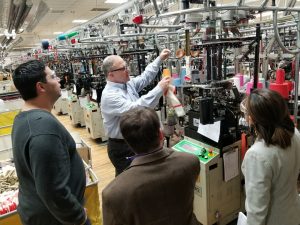By Janis Reyes, Assistant Chief Counsel
Advocacy toured the Sheboygan, Wisconsin, headquarters of Wigwam Mills last week, a small business that knits 20,000 pairs of socks a day from more than 200 machines in its 200,000-square-foot facility. Since 1905, Wigwam has thrived amid the unraveling apparel industry in the U.S., expanding their line of woolen socks to include socks for athletics, outdoors and workwear.
Advocacy is hosting Regional Regulatory Reform Roundtables across the country and visiting small businesses in an effort to hear directly from small businesses about what regulations concern them.
The need to develop a skilled workforce is a common thread that Advocacy has heard from small businesses across the country.
Advocacy spoke to Wigwam Mills Chairman of the Board and CEO Robert Cheseboro, Jr., a third-generation owner who expressed pride with the quality of his products and the fact that this company is still manufacturing products in the United States. Cheseboro stated that many textile and apparel factories have closed and moved their operations to Mexico, due to the price and the scarcity of an available skilled labor force in the United States. Cheseboro stated it takes three years to train someone on their automated knitting machines and these operators can make $21-$22 per hour. They also have hourly positions that make $13-$14 per hour.

Cheseboro stated that Wigwam’s main regulatory concern is a stable international trade policy. This company is most concerned with the current renegotiation of the North American Free Trade Agreement (NAFTA), as 70 percent of their socks are exported to the cold-weather country of Canada. The current negotiation has continued for more than 9 months, and the uncertainty is affecting their bottom line. They need a resolution to this agreement, to know what the rules are and estimate the prices of their products to their Canadians suppliers. If they do not have this finality, their suppliers may go to businesses in other countries, Cheseboro told us.
Wigwam is also struggling to comply with NAFTA rules regarding the origin of their products, as they require that the yarn be purchased in the U.S., Canada, and Mexico or be accessed a high tariff. This company prides itself with making its product in the United States; however, there is a declining domestic wool supply. They are seeking a waiver in this requirement if domestic supplies are unavailable. Advocacy staff told Wigwam that we value this input, as our office is now required to report to Congress on small business views on NAFTA modernization and their dealings with international trade to Canada and Mexico.
Advocacy staffers were awed by the automation adopted throughout the Wigwam headquarters, from the rows of machines that can stitch an intricate sock in minutes to other machines that packaged the socks. We met many of the friendly quality control workers that attach those famous stickers, and toured their old fashioned breakroom complete with a wreath of socks. The tour of the Wigwam headquarters ended of course with a giant pile of missing and defective socks; the company donates 80,000 pairs of these imperfect pairs to homeless organizations in the area. We learned everything about socks and the concerns of apparel manufacturers at our day at Wigwam, a small business that has been knit into the fabric of Wisconsin for a century.
Advocacy was in Wisconsin for Regional Regulatory Reform Roundtable and NAFTA Modernization Outreach Meetings on March 15-16.
Can’t get to a roundtable near you? Fill out this form and tell us about your federal regulatory burdens. We will pass this information on to the appropriate agency and use it in the planning of upcoming Regional Regulatory Reform Roundtables.
Janis Reyes is an Assistant Chief Counsel for Advocacy whose portfolio includes labor and immigration. She can be reached at janis.reyes@sba.gov.
